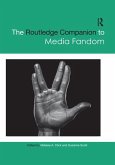Addressing fans' digital practices, this book places fans' play at the centre of a networked mainstream culture that seems to increasingly cater to, amalgamate with and adapt to fans' mediatized play.
Through case studies of the fan communities of the Hamilton musical, and Norwegian streaming hit SKAM, along with examples from many other online fan communities, the book dives into how fans navigate and create play rules as part of their community-building in a networked digital landscape and how they use the digital affordances of social media to engage in language play. It analyses the role of mediatized fan play in the context of political culture and identifies processes of fanization as fans' play moods and modes are integrated into politics. Finally, the book discusses the role of fan play in the context of the global conspiracy theory, QAnon, as those instigating the conspiracy and those who are fans of the movement engage in dark play and deep play, respectively. The book suggests that we might understand fan communities as pioneer communities in the sense that there is increased value placed on fans' mood work and fan play is integrated into other societal domains.
This is an engaging book for scholars and students studying media studies and cultural studies, particularly courses on fan studies, film studies, television studies and mediatization.
Through case studies of the fan communities of the Hamilton musical, and Norwegian streaming hit SKAM, along with examples from many other online fan communities, the book dives into how fans navigate and create play rules as part of their community-building in a networked digital landscape and how they use the digital affordances of social media to engage in language play. It analyses the role of mediatized fan play in the context of political culture and identifies processes of fanization as fans' play moods and modes are integrated into politics. Finally, the book discusses the role of fan play in the context of the global conspiracy theory, QAnon, as those instigating the conspiracy and those who are fans of the movement engage in dark play and deep play, respectively. The book suggests that we might understand fan communities as pioneer communities in the sense that there is increased value placed on fans' mood work and fan play is integrated into other societal domains.
This is an engaging book for scholars and students studying media studies and cultural studies, particularly courses on fan studies, film studies, television studies and mediatization.
"Mediatized Fan Play provocatively and brilliantly rethinks fandom - and fan studies - by emphasizing the full breadth of fan experience rather than just fans' productivity/performance. By centring her analysis on play, Line Nybro Petersen is able to cast a far wider net across the actuality of what fans actually do as fans. At the same time, drawing on the sociology of mediatization means that Petersen can innovatively explore today's mainstreaming of fandom, or 'fanization', in politics and conspiracy theories. Mediatized Fan Play is a superb, engaging and energising book that hits 'play' on important new ways of understanding fandom."
Professor Matt Hills, author of Fan Cultures and Doctor Who: The Unfolding Event
"This welcome addition to media studies places the concept and practice of play at the forefront of understanding fandoms and the broader "fanization" of cultural and political life. In an insightful and engaging analysis that emphasizes the interpersonal nature of play - and the value of play in and of itself - Petersen argues that it is precisely through the playful character of fandom that fandom matters in broader social contexts. Case studies focus on the Norwegian streaming series SKAM, the musical Hamilton, and most provocatively, the QAnon conspiracy theory. This is superb and timely scholarship."
C. Lee Harrington, Professor Emerita of Sociology and Social Justice, Miami University
Professor Matt Hills, author of Fan Cultures and Doctor Who: The Unfolding Event
"This welcome addition to media studies places the concept and practice of play at the forefront of understanding fandoms and the broader "fanization" of cultural and political life. In an insightful and engaging analysis that emphasizes the interpersonal nature of play - and the value of play in and of itself - Petersen argues that it is precisely through the playful character of fandom that fandom matters in broader social contexts. Case studies focus on the Norwegian streaming series SKAM, the musical Hamilton, and most provocatively, the QAnon conspiracy theory. This is superb and timely scholarship."
C. Lee Harrington, Professor Emerita of Sociology and Social Justice, Miami University








